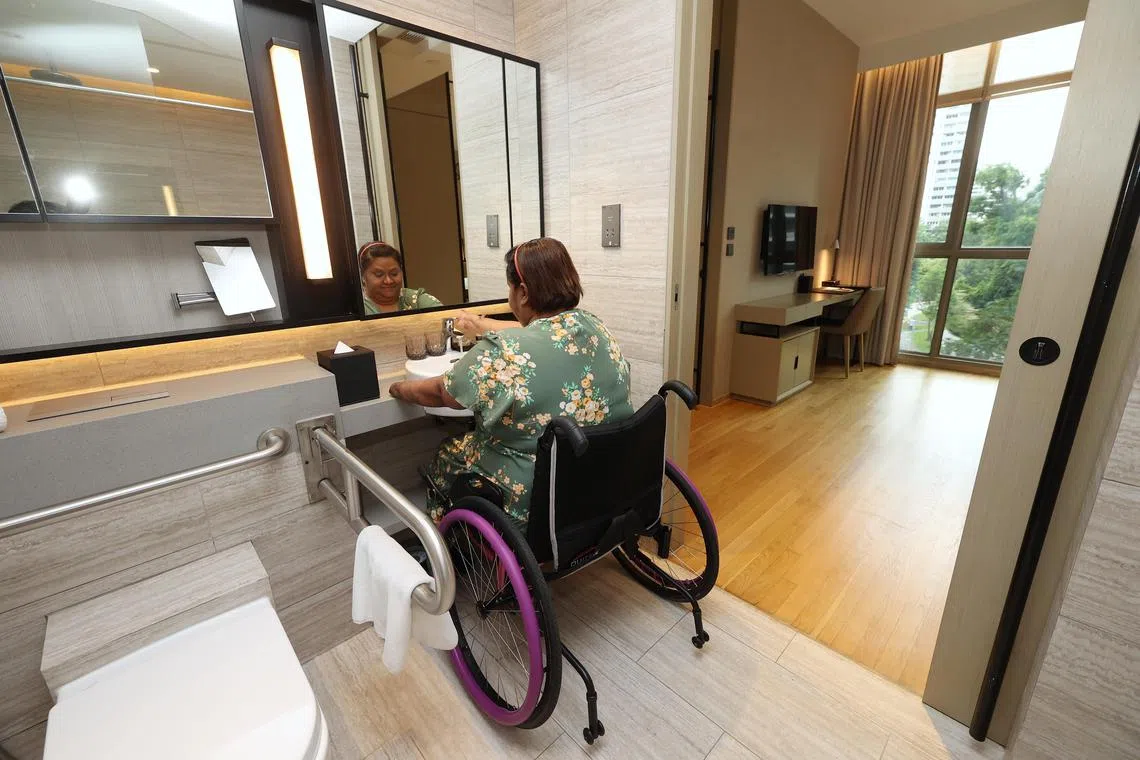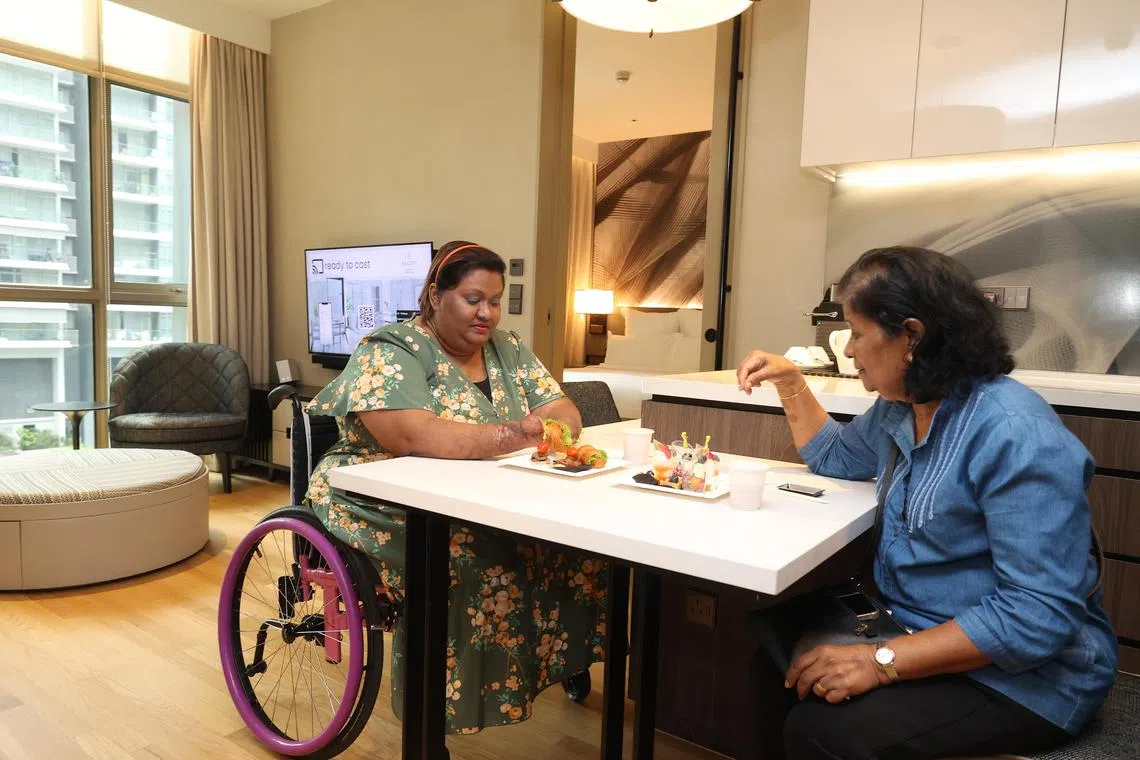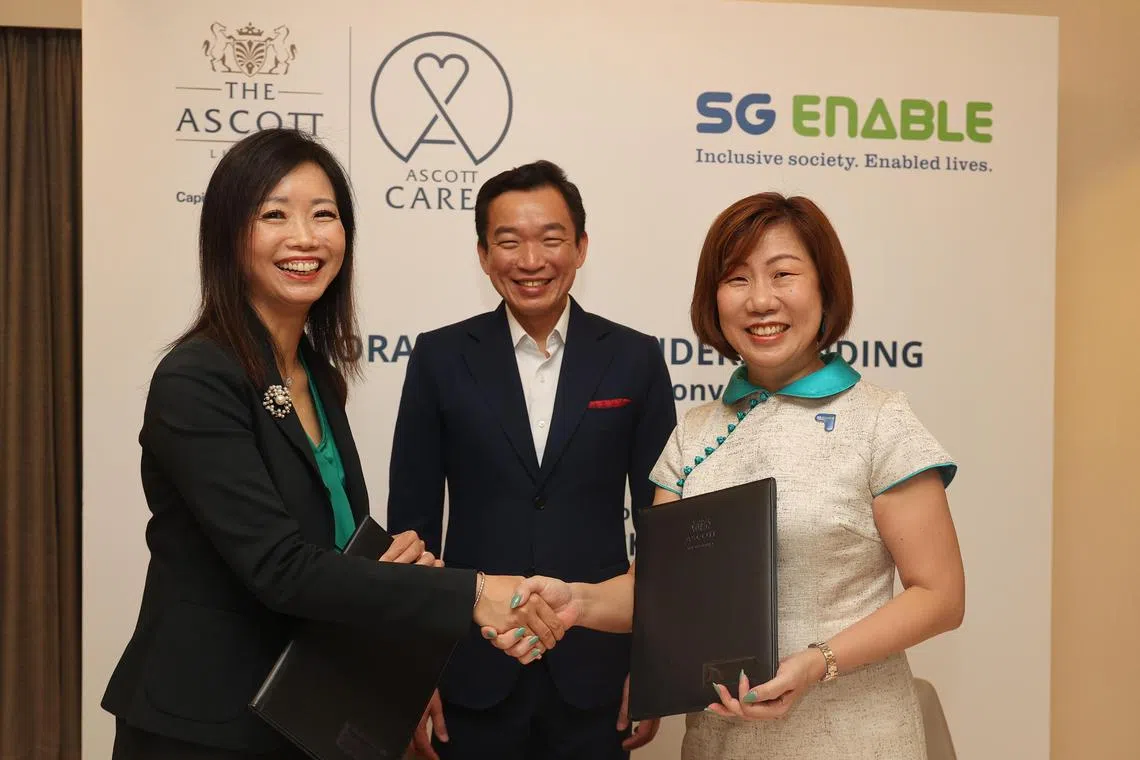Getting feedback from guests with disabilities among efforts to make hospitality group more inclusive
Sign up now: Get ST's newsletters delivered to your inbox

Ms D.G. Carole Ann using the bathroom sink at a serviced apartment at Ascott Orchard, which allows her to roll her wheelchair in.
PHOTO: LIANHE ZAOBAO
SINGAPORE – Most hotel guests would not give a second thought to a bathroom sink without a built-in cabinet underneath, or wall-hung shower gel pumps, but these features make a huge difference to Ms D.G. Carole Ann, who uses a wheelchair.
The 47-year-old service quality control officer underwent amputation of her hands and her legs below the knees
In a serviced apartment at Ascott Orchard Singapore, the suspended sink had ample space underneath for Ms Carole to comfortably position her wheelchair to use it. This allowed her to brush her teeth at the sink, instead of at a table with a container and a cup of water.
The shower gel dispensers are also easier for her to use than bottles.
Ms Carole and her mother Sandra Kumari, 74, who is her caregiver, were invited to stay a night at Ascott Orchard on June 6, to share feedback on their overall experience during the stay – especially when it came to accessibility features and service.
This was part of a new joint initiative by hospitality company The Ascott Limited and SG Enable, the central agency for disability and inclusion.
On June 20, The Ascott, which is wholly owned by CapitaLand Investment, and SG Enable signed a memorandum of understanding (MOU) aimed at improving disability inclusivity in the spaces and guest programmes at the hospitality group’s properties, and in its workforce and policies.

Ms D.G. Carole Ann (left) and her mother having a snack at a dining table designed for wheelchair accessibility during a stay at Ascott Orchard.
PHOTO: LIANHE ZAOBAO
Speaking at the event, Senior Parliamentary Secretary for Social and Family Development Eric Chua said Singapore has taken steps to be more caring and inclusive, but more needs to be done.
“We all know that we can’t do this if it’s just a tag line, or a slogan, and we need to take practical, tangible steps towards that cause,” he said, addressing staff from The Ascott and SG Enable, and three guests with disabilities who were invited for a one-night stay at Ascott Orchard.
In 2017, Ascott Orchard became the first serviced apartment to achieve a Platinum award – the highest of four ratings – in the Universal Design Mark.
The certification scheme by Singapore’s Building and Construction Authority evaluates buildings for their user-friendliness and accessibility for everyone who uses the place and its facilities, including the young, elderly and disabled.

(From left) Ms Beh Siew Kim of CapitaLand Investment, Mr Eric Chua, and SG Enable’s Ms Ku Geok Boon at the MOU signing ceremony on June 20.
PHOTO: LIANHE ZAOBAO
Two one-bedroom deluxe suites out of 220 units at Ascott Orchard have accessibility features such as sliding doors, flat flooring, multiple grab bars and a wall-mounted shower seat, facilitating ease of use for wheelchair users.
The building also has wider walkways for wheelchair users and signs with Braille, such as at lifts and toilets.
But there is still room for improvement to make spaces even more inclusive through design, which is one of the aims of the MOU – and feedback from the invited guests with disabilities will be instrumental.
Having experienced a night’s stay on June 7, Mr Bernard Chew Kim Hock, 53, who is visually impaired, said it would take too long for him to feel the Braille marks on the lift buttons.
He suggested having access cards for guests to tap in the lift to take them directly to the level of their rooms.
Mr Chew, who lost his vision in 2017 due to sudden retinal detachment in both eyes, works as a host at NOX – Dine in the Dark, a restaurant that serves food in darkness to simulate visual impairment.
He said he was impressed by how, during check-in at Ascott Orchard, the staff spoke to him directly instead of his partner.
Most people he encounters speak to his partner because he is visually impaired, even though he can fully understand the conversation. “That’s something I’m always particular about, whether I’m alone or with friends,” he said.
“The staff really wowed me. That was the first step and also when I knew I was in good hands.”
After check-in, the staff also gave him a two-hour tour of his room and the hotel, so he could make a mind map of the space to navigate the place alone later.
Ms Carole agreed that efforts by the staff to make her feel comfortable made a difference to her experience. “It’s more than the accessibility of the room – it’s more about the people. I didn’t feel like they were trying too hard, they were always reachable.”
Under the MOU, The Ascott also plans to create programmes for guests with disabilities to enrich their stay experience. The first inclusive programme is slated to be rolled out in Singapore in 2024.
The hospitality group will progressively hire more people with disabilities across its properties in Singapore, redesigning job scopes and workspaces where necessary.
SG Enable and The Ascott will also co-develop a series of hospitality-specific disability inclusion training courses by 2025. Such training, held at the Ascott Centre for Excellence, will be open to Ascott staff and others in the hospitality sector, as well as members of the public.
About 50 Ascott employees have attended disability awareness and disability management training conducted by SG Enable since March, with plans for all staff from the company’s 20 properties in Singapore to complete similar training by 2026.
This partnership will also create a guide for disability inclusion efforts that will be used at over 950 Ascott properties around the world.
Ms Beh Siew Kim, chief financial and sustainability officer for CapitaLand Investment’s lodging business, said: “If you think about it, 15 per cent of the population has some form of permanent or temporary disability.”
Everybody deserves to travel, and everybody deserves to holiday, she added.
“With SG Enable, we want to focus on disability management within the hospitality sector, to cover both the hardware and software parts specific to hospitality,” said Ms Beh.
“Having a universal design falls under hardware, while software is how people can be trained to deal with disabilities.”
In 2023, Sentosa Development Corporation, the Ministry of Social and Family Development and SG Enable also inked an MOU to create fair employment and more inclusive workspaces for those with disabilities.
Other hospitality players such as Marina Bay Sands and Concorde Hotel have also taken steps towards disability inclusion, and have been recognised with an Enabling Mark.
Administered by SG Enable, this national-level accreditation framework recognises organisations that have adapted their jobs so that those with disabilities can perform them, or modified their services to accommodate such individuals.
SG Enable chief executive Ku Geok Boon said: “The MOU marks the first of its scale in the hospitality sector, and we look forward to creating inclusive spaces, building inclusive capabilities, and fostering a culture of respect and empowerment for all.”
Correction note: In an earlier version of the story, we said The Ascott has 24 properties in Singapore. A spokesperson for the hospitality group has since clarified that it has 20 properties here.


